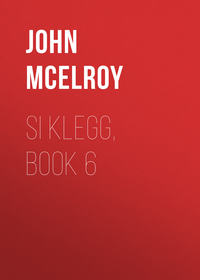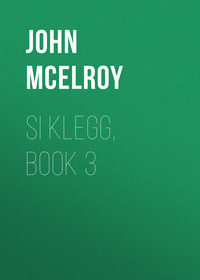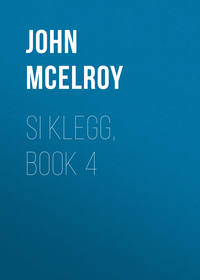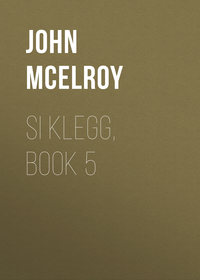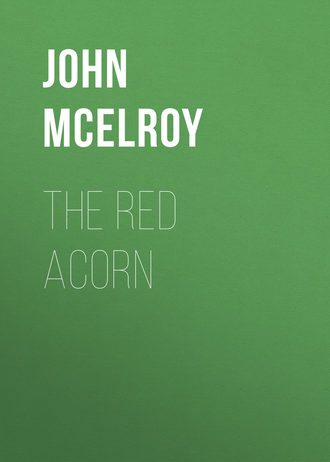 полная версия
полная версияThe Red Acorn
He laughed heartily at his own sarcasm, but Abe was not to be moved by such frivolity, and answered glumly:
“O, yes; laugh about it, if you choose. That’s your way: giggle over everything. But when I play background, I want it to be with something worth while in the foreground. I don’t hanker after making myself a foil to show off such fellers as our officers are, to good advantage.”
“That don’t bother me any more than it does a mountain to serve as a background for a nanny goat and a pair of sore-eyed mules!”
“Yes, but the mountain sometimes has an opportunity to drop an avalanche on ‘em.”
At this point of the discussion they arrived at the company grounds, and had scarcely time to snatch up their guns and don their belts before the company moved out to take its place in the regimental line.
The occasion of Lieutenant Alspaugh’s elaborate personal ornamentation now manifested itself. By reason of Captain Bennett’s absence, he was in command of the company, and was about to make his first appearance on parade in that capacity. Two or three young women, of the hollyhock order of beauty, whom he was very anxious to impress, had been brought to camp, to witness his apotheosis into a commanding officer.
The moment, however, that he placed himself at the head of the company and drew sword, the chill breath of distrust sent the mercury of his self-confidence down to zero. It looked so easy to command a company when some one else was doing it; it was hard when he tried it himself. All the imps of confusion held high revel in his mind when he attempted to give the orders which he had conned until he supposed he had them “dead-letter perfect.” he felt his usually-unfailing assurance shrivel up under the gaze of hundreds of mercilessly critical eyes. He managed to stammer out:
“ATTENTION, COMPANY! FORWARD, FILE RIGHT, MARCH!”But as the company began to execute the order, it seemed to be going just the opposite to what he had commanded, and he called out excitedly:
“Not that way! Not that way! I said ‘file right,’ and you’re going left.”
“We are filing right,” answered some in the company. “You’re turned around; that’s what’s the matter with you.”
So it was. He had forgotten that when standing facing the men, he must give them orders in reverse from what the movement appeared to him. This increased his confusion, until all his drill knowledge seemed gone from him. The sight of his young lady friends, clad in masses of primary colors, stimulated him to a strong effort to recover his audacity, and bracing himself up, he began calling out the guide and step, with a noisy confidence that made him heard all over the parade ground:
“Left! left! left! Hep! hep! hep! Cast them head and eyes to the right!”
Trouble loomed up mountainously as he approached the line. Putting a company into its place on parade is one of the crucial tests of tactical proficiency. To march a company to exactly the right spot, with every man keeping his proper distance from his file-leader—“twenty-eight inches from back to breast,” clear down the column, so that when the order “front” was given, every one turns, as if on pivot, and touches elbows with those on each side of him, in a straight, firm wall of men, without any shambling “closing up,” or “side-stepping” to the right or left,—to do all this at word of command, looks very simple and easy to the non-military spectator, as many other very difficult things look simple and easy to the inexperienced. But really it is only possible to a thoroughly drilled company, held well in hand by a competent commander. It is something that, if done well, is simply done well, but if not done well, is very bad. It is like an egg that is either good or utterly worthless.
Alspaugh seemed fated to exhaust the category of possible mistakes. Coming on the ground late he found that a gap had been left in the line for his company which was only barely sufficient to receive it when it was aligned and compactly “dressed.”
In his nervousness he halted the company before it had reached the right of the gap by ten paces, and so left about one-quarter of the company lapping over on the one to his left. Even this was done with an unsightly jumble. His confusion as to the reversal of right and left still abode with him. He commanded “right face” instead of “front,” and was amazed to see the whole one hundred well-drilled men whirl their backs around to the regiment and the commanding officer. A laugh rippled down the ranks of the other companies; even the spectators smiled, and something sounded like swearing by the Adjutant and Sergeant-Major.
Alspaugh lifted his plumed hat, and wiped the beaded perspiration from his brow with the back of one of the yellow gauntlets.
“Order an ‘about face,’” whispered the Orderly-Sergeant, whose face was burning with shame at the awkward position in which the company found itself.
“ABOUT—FACE!” gasped Alspaugh.
The men turned on their heels.
“Side-step to the right,” whispered the Orderly.
“Side-step to the right,” repeated Alspaugh, mechanically.
The men took short side-steps, and following the orders which Alspaugh repeated from the whispered suggestions of the Orderly, the company came clumsily forward into its place, “dressed,” and “opened ranks to the rear.” When at the command of “parade-rest,” Alspaugh dropped his saber’s point to the ground, he did it with the crushed feeling of a strutting cock which has been flung into the pond and emerges with dripping feathers.
He raised his heart in sincere thanksgiving that he was at last through, for there was nothing more for him to do during the parade, except to stand still, and at its conclusion the Orderly would have to march the company back to its quarters.
But his woes had still another chapter. The Inspector-General had come to camp to inspect the regiment, and he was on the ground.
Forty years of service in the regular army, with promotion averaging one grade every ten years, making him an old man and a grandfather before he was a Lieutenant-Colonel, had so surcharged Col. Murbank’s nature with bitterness as to make even the very air in his vicinity seem roughly astringent. The wicked young Lieutenants who served with him on the Plains used to say that his bark was worse than his bite, because no reasonable bite could ever be so bad as his bark. They even suggested calling him “Peruvian Bark,” because a visit to his quarters was worse than a strong does of quinia.
“Yeth, that’th good,” said the lisping wit of the crowd. “Evely bite ith a bit, ain’t it? And the wortht mutht be a bitter, ath he ith.”
The Colonel believed tha the whole duty of man consisted in loving the army regulations, and in keeping their commandments. The best part of all virtue was to observe them to the letter; the most abhorrent form of vice, to violate or disregard even their minor precepts.
His feelings were continually lacerated by contact with volunteers, who cared next to nothing for the FORM of war-making, but everything for its spirit, and the martinet heart within him was bruised and sore when he came upon the ground to inspect the regiment.
Alspaugh’s blundering in bringing the company into line awakened this ire from a passivity to activity.
“I’ll have that dunderhead’s shoulder-straps off inside of a fortnight,” he muttered between his teeth.
The unhappy Lieutenant’s inability to even stand properly during the parade, or repeat an order intensified his rage. When the parade was dismissed the officers, as usual, sheathed their swords, and forming a line with the Adjutant in the center, marched forward to the commanding and inspecting officers, and saluted. Then the wrath of the old Inspector became vocable.
“What in God’s name,” he roared, fixing his glance upon Alspaugh so unmistakably that even the latter’s rainbow-clad girls, who had crowded up closely, could not make a mistake as to the victim of the expletives. “What in God’s name, sir,” repeated the old fellow with purpling face, “do you mean by bringing your company on to the ground in that absurd way, sir? Did you think, sir, that it was a hod of brick—with which I have no doubt you are most familiar—that you could dump down any place and any how, sir? Such misconduct is simply disgraceful, sir, I’d have you know. Simply disgraceful, sir.”
He paused for breath, but Alspaugh had no word of defense to offer.
“And what do you mean, sir,” resumed the Inspector, after inflating his lungs for another gust, “what in the name of all the piebald circus clowns that ever jiggered around on sawdust, do you mean by coming on parade dressed like the ringmaster of a traveling monkey-show, sir? Haven’t you any more idea of the honor of wearing a United States sword—the noblest weapon on earth, sir—than to make yourself look like the drum-major of a band of nigger minstrels, sir! A United States officer ought to be ashamed to make a damned harlequin of himself, sir. I’d have you to understand that most distinctly, sir!”
The Inspector’s stock of breath, alas, was not so ample as in the far-off days when his sturdy shoulders bore the modest single-bar, instead of the proud spread eagle of the present. Even had it been, the explosive energy of his speech would have speedily exhausted it. Compelled to stop to pump in a fresh supply, the Colonel of the regiment took advantage of the pause to whisper in his ear:
“Don’t be too rough on him, please. He’s a good man but green. Promoted from the ranks for courage in action. First appearance on parade. He’ll do better if given a chance.”
The Inspector’s anger was mollified. Addressing himself to all the officers, he continued in a milder tone:
“Gentlemen, you seem to be making progress in acquiring a knowledge of your duties, though you have a world of things yet to learn. I shall say so in my report to the General. You can go to your quarters.”
The line of officers dissolved, and the spectators began to melt away. Alspaugh’s assurance rose buoyantly the moment that the pressure was removed. He raised his eyes from the ground, and looked for the young ladies. They had turned their backs and were leaving the ground. He hastened after them, fabricating as he walked an explanation, based on personal jealousy, of the Inspector’s treatment of him. He was within a step of overtaking them when he heard one say, with toss of flaunting ribbons, and hoidenish giggle:
“Did you EVER see ANY-body wilt as Alspaugh did when old Bite-Your-Head-Off-In-a-Minute was jawing him? It was so awfully FUNNY that I just thought I SHOULD DIE.”
The sentence ended with the picturesque rapid CRESCENDO employed by maidens of her type in describing a convulsive experience.
“Just didn’t he,” joined in another. “I never saw ANY-thing so funny in all my BORN DAYS. I was AFRAID to look at either one of YOU; I knew if I DID I would BURST RIGHT OUT laughing. I couldn’t’ve HELPED it—I know I COULDN’T, if I’d’a knowed I’d’a DIED the next MINUTE.”
“This would seem to be a pretty good time to drop the fellow,” added the third girl, reflectively.
Alspaugh turned and went in another direction. At the 9 o’clock roll-call he informed the company that the Inspector was well pleased with its appearance on parade.
Chapter VIII. The Tedium of Camp
And you, good yeoman, Whose limbs were made in England, show us here The mettle of your pasture; let us swear That you are worth your breeding.—Henry V.To really enjoy life in a Camp of Instruction requires a peculiar cast of mind. It requires a genuine liking for a tread-mill round of merely mechanical duties; it requires a taste for rising in the chill and cheerless dawn, at the unwelcome summons of “reveille,” to a long day filled with a tiresome routine of laborious drills alternating with tedious roll-calls, and wearisome parades and inspections; it requires pleased contentment with walks continually cut short by the camp-guard, and with amusements limited to rough horse-play on the parade-ground, and dull games of cards by sputtering candles in the tent.
As these be tastes and preferences notably absent from the mind of the average young man, our volunteers usually regard their experience in Camp of Instruction as among the most unpleasant of their war memories.
These were the trials that tested Harry Glen’s resolution sorely. When he enlisted with the intention of redeeming himself, he naturally expected that the opportunity he desired would be given by a prompt march to the field, and a speedy entrance into an engagement. He nerved himself strenuously for the dreadful ordeal of battle, but this became a continually receding point. The bitter defeat at Bull Run was bearing fruit in months of painstaking preparation before venturing upon another collision.
Day by day he saw the chance of retrieving his reputation apparently more remote. Meanwhile discouragements and annoyances grew continually more plentiful and irksome. He painfully learned that the most disagreeable part of war is not the trial of battle, but the daily sacrifices of personal liberty, tastes, feelings and conveniences involved in camp-life, and in the reduction of one’s cherished individuality to the dead-level of a passive, obedient, will-less private soldier.
“I do wish the regiment would get orders to move!” said almost hourly each one of a half-million impatient youths fretting in Camps of Instruction through the long Summer of 1861.
“I do wish the regiment would get orders to move!” said Harry Glen angrily one evening, on coming into the Surgeon’s tent to have his blistered hands dressed. He had been on fatigue duty during the day, and the Fatigue-Squad had had an obstinate struggle with an old oak stump, which disfigured the parade-ground, and resisted removal like an Irish tenant.
“I am willing—yes, I can say I am anxious, even—to go into battle,” he continued, while Dr. Paul Denslow laid plasters of simple cerate on the abraded palms, and then swathed them in bandages. “Anything is preferable to this chopping tough stumps with a dull ax, and drilling six hours a day while the thermometer hangs around the nineties.”
“I admit that there are things which would seem pleasanter to a young man of your temperament and previous habits,” said the Surgeon, kindly. “Shift over into that arm-stool, which you will find easier, and rest a little while. Julius, bring in that box of cigars.”
While Julius, who resembled his illustrious namesake as little in celerity of movement as he did in complexion, was coming, the Surgeon prepared a paper, which he presented to Harry, saying:
“There, that’ll keep you off duty to-morrow. After that, we’ll see what can be done.”
Julius arrived with the cigars as tardily as if he had had to cross a Rubicon in the back room. Two were lighted, and the Surgeon settled himself for a chat.
“Have you become tired of soldier-life?” asked he, studying Harry’s face for the effect of the question.
“I can not say that I have become tired of it,” said Harry, frankly, “because I must admit that I never had the slightest inclination to it. I had less fancy for becoming a soldier than for any other honorable pursuit that you could mention.”
“Then you only joined the army—”
“From a sense of duty merely,” said Harry, knocking the ashes from his cigar.
“And the physical and other discomforts now begin to weight nearly as much as that sense of duty?”
“Not at all. It only seems to me that there are more of them than are absolutely essential to the performance of that duty. I want to be of service to the country, but I would prefer that that service be not made unnecessarily onerous.”
“Quite natural; quite natural.”
“For example, how have the fatigues and pains of my afternoon’s chopping contributed a particle toward the suppression of the rebellion? What have my blistered hands to do with the hurts of actual conflict?”
“Let us admit that the connection is somewhat obscure,” said Doctor Denslow, philosophically.
“It is easier for you, than for me, to view the matter calmly. Your hands are unhurt. I am the galled jade whose withers are wrung.”
“Body and spirit both bruised?” said the Surgeon, half reflectively.
Harry colored. “Yes,” he said, rather defiantly. “In addition to desiring to serve my country, I want to vindicate my manhood from some aspersions which have been cast upon it.”
“Quite a fair showing of motives. Better, perhaps, than usual, when a careful weighing of the relative proportions of self-esteem, self-interest and higher impulses is made.”
“I am free to say that the discouragements I have met with are very different, and perhaps much greater than I contemplated. Nor can I bring myself to belive that they are necessary. I am trying to be entirely willing to peril life and limb on the field of battle, but instead of placing me where I can do this, and allowing me to concentrate all my energies upon that object, I am kept for months chafing under the petty tyrannies of a bullying officer, and deprived of most of the comforts that I have heretofore regarded as necessary to my existence. What good can be accomplished by diverting forces which should be devoted to the main struggle into this ignoble channel? That’s what puzzles and irritates me.”
“It seems to be one of the inseparable conditions of the higher forms of achievement that they require vastly more preparation for them than the labor of doing them.”
“That’s no doubt very philosophical, but it’s not satisfactory, for all that.”
“My dear boy, learn this grand truth now: That philosophy is never satisfactory; it is only mitigatory. It consists mainly in saying with many fine words: ‘What can’t be cured must be endured.’”
“I presume that is so. I wish, though, that by the mere syaing so, I could make the endurance easier.”
“I can make your lot in the service easier.”
“Indeed! how so?”
“By having you appointed my Hospital Steward. I have not secured one yet, and the man who is acting as such is so intemperate that I feel a fresh sense of escape with every day that passes without his mistaking the oxalic acid for Epsom salts, to the destruction of some earnest but constipated young patriot’s whole digestive viscera.
“If you accept this position,” continued the Surgeon, flinging away his refractory cigar in disgust, and rising to get a fresh one, “you will have the best rank and pay of any non-commissioned officer in the regiment; better, indeed, than that of a Second Lieutenant. You will have your quarters here with me, and be compelled to associate with no one but me, thus reducing your disagreeable companions at a single stroke, to one. And you will escape finally from all subserviency to Lieutenant Alspaugh, or indeed to any other officer in the regiment, except your humble servant. As to food, you will mess with me.”
“Those are certainly very strong inducements,” said Harry, meditating upon the delightfulness of relief from the myriad of rasping little annoyances which rendered every day of camp-life an infliction.
“Yes, and still farther, you will never need to go under fire, or expose yourself to danger of any kind, unless you choose to.”
Harry’s face crimsoned to the hue of the western sky where the sun was just going down. He started to answer hotly, but an understanding of the Surgeon’s evident kindness and sincerity interposed to deter him. He knew there was no shaft of sarcasm hidden below this plain speech, and after a moment’s consideration he replied:
“I am very grateful, I assure you, for your kindness in this matter. I am strongly tempted to accept your offer, bu there are still stronger reasons why I should decline it.”
“May I ask your reasons?”
“My reasons for not accepting the appointment?”
“Yes, the reasons which impel you to prefer a dinner of bitter herbs, under Mr. Alspaugh’s usually soiled thumb, to a stalled ox and my profitable society,” said the Surgeon, gayly.
Harry hesitated a moment, and then decided to speak frankly. “Yes,” he said, “your kindness gives you the right to know. To not tell you would show a lack of gratitude. I made a painful blunder before in not staying unflinchingly with my company. The more I think of it, the more I regret it, and the more I am decided not to repeat it, but abide with my comrades and share their fate in all things. I feel that I no longer have a choice in the matter; I must do it. But there goes the drum for roll-call. I must go. Good evening, and very many thanks.”
“The young fellow’s no callow milksop, after all,” said the Surgeon Denslow, as his eyes followed Harry’s retreating form. “His gristle is hardening into something like his stern old father’s backbone.”
Chapter IX. On the March
“He smelleth the battle afar off, the thunder of the Captains and the shouting.”– Job.The weary weeks in Camp of Instruction ended with the Summer. September had come, and Nature was hanging out crimson battle-flags every-where—on the swaying poppy and the heavy-odored geranium. The sumach and the sassafras wore crimson signals of defiance, and the maples blazed with the gaudy red, yellow and orange of warlike pomp.
The regiment made its first step on Kentucky soil with a little bit of pardonable ostentation. Every one looked upon it as the real beginning of its military career. When the transport was securely tied up at the wharf, the Colonel mounted his horse, drew his sword, placed himself at the head of the regiment, and gave the command “Forward.” Eleven hundred superb young fellows, marching four abrest, with bayonets fixed, and muskets at “right shoulder shift,” strode up the bank after him and went into line of battle at the top, where he made a short soldierly speech, the drums rolled, the colors dipped, the men cheered, and the band played “Star-spangled Banner” and “Dixie.”
Three years later the two hundred survivors of this number returning from their “Veteran furlough,” without a band and with their tattered colors carefully cased, came off a transport at the same place, without uttering a word other than a little grumbling at the trouble of disposing of some baggage, marched swiftly and silently up the bank, and disappeared before any one fairly realized that they were there. So much had Time and War taught them.
“Now our work may be said to be fairly begun.” said the Colonel, turning from the contemplation of his regiment, and scanning anxiously the tops of the distant line of encircling hills, as if he expected to see there signs of the Rebels in strong force. All the rest imitated his example, and studied the horizon solicitously. “And I expect we shall have plenty of it!” continued the Colonel.
“No doubt of that,” answered the Major. “They say the Rebels are filling Kentucky with troops, and going to fight for every foot of the Old Dark and Bloody Ground. I think we will have to earn all we get of it.”
“To-day’s papers report,” joined in Surgeon Denslow, “that General Sherman says it will take two hundred thousand troops to redeem Kentucky.”
“Yes,” broke in the Colonel testily, “and the same papers agree in pronouncing Sherman crazy. But no matter how many or how few it takes, that’s none of our affair. We’ve got eleven hundred good men in ranks, and we’re going to do all that eleven hundred good men can do. God Almighty and Abe Lincoln have got to take care of the rest.”
It will be seen that the Colonel was a very practical soldier.
“First think we know, the Colonel will be trying to make us ‘leven hundred clean out ‘leven thousand Rebs,” growled Abe Bolton.
“Suppose the Colonel should imagine himself another Leonidas, and us his Spartan band, and want us to die around him, and start another Thermopylae down her in the mountains, some place,” suggested Kent Edwards, “you would cheerfully pass in your checks along with the rest, so as to make the thing an entire success, wouldn’t you?”
“The day I’m sent below, I’ll take a pile of Rebs along to keep me company,” answered Abe, surlily.
Glen, standing in the rear of his company in his place as file-closer, listened to these words, and saw in the dim distance and on the darkling heights the throngs of fierce enemies and avalanches of impeding dangers as are likely to oppress the imagination of a young soldier at such unfavorable moments. The conflict and carnage seemed so imminent that he half expected it to begin that very night, and he stiffened his sinews for the shock.


